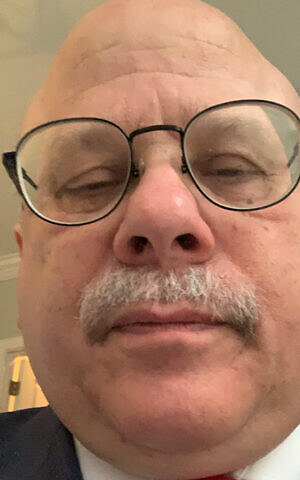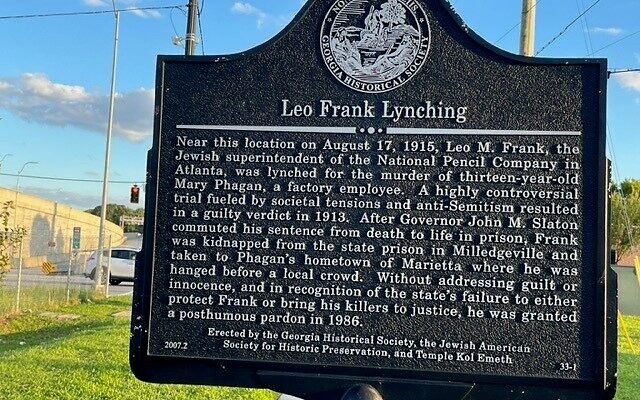Aug. 17, 1915: My Life with Leo Frank
Rabbi Lebow shares about his personal history with Leo Frank’s legacy.
Rabbi Steven Lebow is the spiritual leader of Temple Kol Emeth in Marietta.
On June 2, 1995, Tom Watson Brown wrote a letter to the editor of a local paper, complaining that the paper had reported that a “mob” had lynched Leo Frank and that the word “mob” did not adequately describe the “strictly disciplined representing Marietta’s leading families.”
Two weeks later, Tom Watson Brown continued to justify the actions of the lynch mob, since it was “obvious that Frank was guilty.”
At that time, I did not realize who Tom Watson Brown was. He was the great-grandson of Tom Watson, the man who fanned the flames of Jew-hatred that led to Frank’s murder. I dashed off a quick letter Mr. Brown.
I wrote to a local paper that “It is difficult to know what planet Tom Watson Brown lives on, but it is clearly not the Earth.”
In my letter to the editor, I went on to try to educate the newer arrivals to Cobb County on the intricacies of the case and why it was clear that Frank had been falsely accused and then wrongly convicted.
A Marietta native mentioned to me that it was open knowledge where the Frank lynching had occurred. Although the actual lynching tree had been cut down, the site of the lynching was a squat office building, next to the I-75 overpass. As everyone in Marietta knew, except for me, at that time, Frank had been lynched on the site where Cobb’s sheriff regularly nursed a drink or two. Hence, the name of the Marietta Street, Frey’s Gin Mill.
As a relatively new-comer and as someone who was obviously Jewish and who sounded like a Yankee, I shyly approached the owner of the office building, Roy Varner.

Mr. Varner, an early developer in Cobb County, could not have been nicer or kinder to me. He acknowledged that his building was built on the site of the Frank lynching. He had bought the building in the 1950s, but he had been aware of the historical association on his property.
I asked Roy, “Can we place a memorial plaque (Yahrzeit) on your building and have a memorial service on your property, on the 80th anniversary of the Frank lynching?”
He could have turned me away or simply shown me the door. Instead, he was as gracious and as kind as I have discovered that Mariettans truly are.
“Of course, you can have your service here, “he said to me. “Put your memorial plaque on my building, so that people will remember it was a bad time and that a thing like that will never happen again.”
With Roy Varner’s permission and blessing, I placed the first Frank memorial plaque on the building, made by a local signage company. On Sunday, Aug. 14, 1995, I organized the first ever memorial service for Leo Frank, on the site of the lynching. I was joined by Dale Schwartz, the attorney who had argued in 1984 for Frank’s pardon.
We were joined by a crowd of Mariettans that day, Jews and Christian alike. Staying up late one night in July 1995, I had penned the words, “Leo Frank was ‘Wrongly accused, Falsely Convicted, Wantonly Murdered.’” I was told to leave my name off the plaque, lest it cause personal attacks on me. I signed that first plaque “(Leo Frank) remembered by the Jewish Community of Cobb County.”
Even so, my caution wasn’t rewarded. People saw my name occasionally and sent me the odd hate letter or death threat.
A number of other events happened in the years following the placing of that first plaque. The Pulitzer Prize winning play, “Parade,” premiered on Broadway.
Another play about the case, “The Lynching of Leo Frank,” premiered at Marietta’s “Theater in the Square.” (Atlanta Journal Constitution, Aug. 21, 2000 – Section C, front page)
An AJC reporter asked Tom Watson Brown if the City of Marietta should issue an apology for the lynching of Leo Frank. I should not have been surprised by Brown’s comment, but I was.
Leo Frank was killed not “because of his religious persuasion, but because the Jews bribed the governor [John Slaton] to commute Frank’s sentence, “said Brown.
When the AJC reporter dug even further, Brown said, “Maybe the Frank family should apologize for paying off the governor!”
Reading Brown’s quotes made me wonder if I had entered some parallel universe where the facts of Frank’s innocence were ignored, and Tom Watson Brown had decided to revive that old stereotype that the Jews have all the money.
By 2000, I had discovered who Tom Watson Brown was. He was a Harvard educated lawyer, one of the wealthiest men in the city, and a part owner of the Atlanta Falcons.
I fired off a letter of complaint to NFL Commissioner Paul Tagliabue. A few days later, Brown wrote me a personal letter, in which he acknowledged that the Frank lynching was a tragedy… “but only for the Mary Phagan,” implying that Leo Frank got exactly what he deserved!
Ten years later, I returned to the very same site and placed a second plaque there which read simply, “Am I my brother’s Keeper? On the 90th anniversary of the lynching and in memory of all victims of lynching.” This time, I wasn’t afraid of signing the second plaque.
Twenty-eight years later, after I had gathered that first group to memorialize Leo Frank, Tom Watson Brown is gone. Mr. Brown represented a part of the era of the Old South- antisemitism and naked racism. But the current residents of Marietta have always been gracious and encouraging to me in my efforts to write about the Frank case. We live now in what I call the “Newer South.” In that South, there is a Marietta free of hatred and prejudice.
The arc of Southern history is long, but it moves ever upwards. Eventually, Frank will receive the complete exoneration that he deserves. Until that time, I’ll stand at Frey’s Gin Mill and Roswell Road every Aug. 17 and offer a simple Mourner’s Kaddish for him, a prayer in memory of the dead.
It’s the least I can do as we await the eventual exoneration of a man charged with a crime he did not commit.
Rabbi Steven Lebow is the Senior Rabbi Emeritus of Temple Kol Emeth in Marietta, Ga.




comments